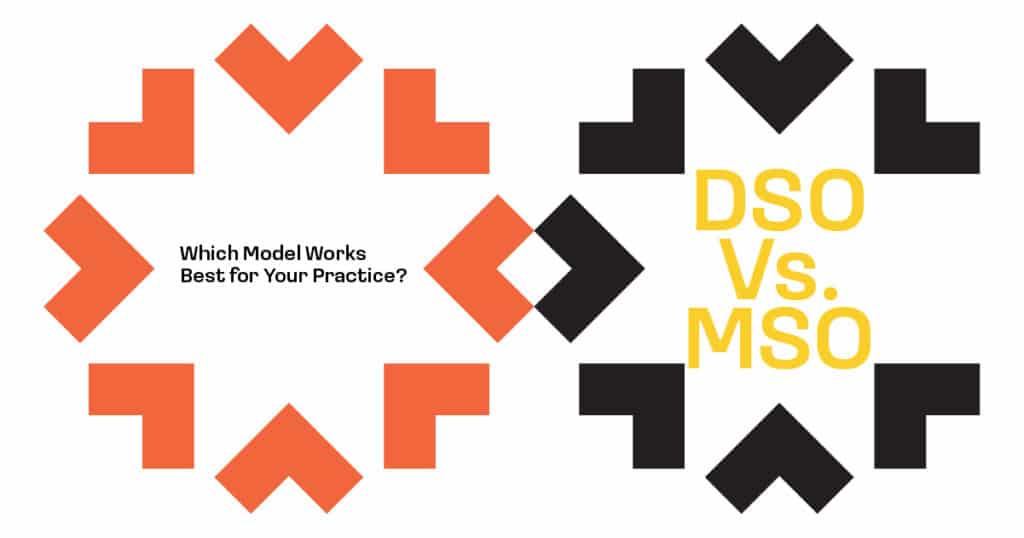Choosing the right business model is one of a dentist’s most important decisions. The structure you select will determine how much control you have over your practice, how your finances are managed, and what administrative support you receive.
In today’s evolving dental industry, two primary models have gained popularity: DSO vs. MSO. While both provide valuable support, they function differently and cater to different professional needs.
A dental service organization (DSO) is a corporate entity that provides non-clinical administrative support to dental practices. This allows dentists to focus on patient care while leaving business operations, such as billing, marketing, and staffing, to the DSO.
On the other hand, a Management Service Organization (MSO) also offers administrative assistance, but unlike a DSO, it does not take ownership of the practice. Instead, it works under a contractual agreement, allowing the dentist to retain complete control.
Understanding the key differences between these models is essential for making the right decision. Whether you are looking for stability with a DSO dental model or greater autonomy with an MSO, this guide will help you determine the best path forward for your practice.
DSO Vs. MSO: What’s the Difference?
The primary distinction between DSO vs. MSO comes down to ownership and control. What is a DSO? A dental service organization owns or operates dental practices and provides centralized business management.
This means that while the dentist focuses on treating patients, the DSO handles everything from insurance claims to hiring staff. Many dentists opt for DSOs because they offer financial stability and access to cutting-edge technology without the burden of running a business.
The MSO Model: Retaining Ownership and Control
An MSO, on the other hand, is structured differently. While it offers similar administrative support, it does not own the practice itself. Dentists who choose an MSO model maintain complete control over their business decisions, including patient care, treatment plans, and practice policies. This makes MSOs a preferred choice for those who want the benefits of professional management while still retaining full ownership of their practice.
Both models aim to reduce dentists’ operational workloads, but the level of control and financial structure differ significantly. DSOs appeal to those seeking a structured, corporate-backed career, while MSOs are ideal for practitioners who prioritize independence but still need business support.
How DSOs and MSOs Support Dental Practices
The dental service organizations that operate under the DSO model are designed to streamline operations and improve efficiency. Dentists who work under a DSO dental arrangement benefit from handling all their business needs by a dedicated corporate team.
From payroll and legal compliance to marketing and equipment procurement, a DSO ensures that the business side of dentistry is fully optimized. This primarily benefits new graduates or dentists who want to scale their practice without worrying about administrative tasks.
MSOs: Providing Support While Maintaining Independence
On the other hand, MSOs focus on providing business and operational support while allowing dentists to remain independent owners. A comparison shows that while DSOs offer financial security and extensive resources, MSOs provide flexibility and autonomy.
Dentists who choose an MSO model can make their own decisions regarding patient care and treatment plans while outsourcing administrative burdens to a professional management team. This balance makes MSOs an attractive alternative for those who want to maintain control without handling the complexities of practice management alone.
Pros and Cons of Working With a DSO
When evaluating the DSO dental model, weighing the advantages and disadvantages is essential. One of the most significant benefits of joining a DSO is its financial stability. Dentists employed by DSOs often receive guaranteed salaries, comprehensive benefits, and access to state-of-the-art facilities.
Additionally, DSOs invest heavily in marketing, ensuring a steady stream of patients without the need for individual advertising efforts.
Challenges of Working With a DSO
However, working with a DSO also has its limitations. Since the dental service organization owns the practice, dentists often have less autonomy in decision-making. The corporate office typically sets treatment protocols, appointment scheduling, and pricing structures.
This lack of control can be a dealbreaker for dentists who prefer independent practice. Additionally, revenue sharing is another consideration, as DSOs take a portion of the earnings generated by the practice in exchange for their services.
For many professionals, the decision between DSO vs. MSO comes down to career goals. A DSO may be the right fit if you value security, stability, and professional growth opportunities. But if autonomy and ownership are your priorities, an MSO might be a better alternative.
Best Dental DSOs to Work for in 2025
Suppose you are considering joining a dental service organization, choosing one that aligns with your career objectives. Some of the best dental DSOs to work for in 2025 include Aspen Dental, Heartland Dental, Pacific Dental Services, and MB2 Dental. These organizations are known for providing competitive salaries, career development opportunities, and access to cutting-edge dental technology.
Reviewing a DSO dental list of top companies can help you identify the best fit for your professional goals. Each dental service organization offers unique benefits, so it’s essential to research which one best aligns with your desired career path.
Choosing the Right Model for Your Dental Practice
Ultimately, the decision between DSO vs. MSO depends on what you value most in your career. If you are looking for financial security, structured career advancement, and relief from administrative tasks, a DSO dental arrangement might be the right fit. However, if you prefer complete control over your practice while benefiting from professional management, an MSO offers the perfect balance of autonomy and support.
Evaluating your long-term goals will help you determine whether a dental service organization or a Management Service Organization is best for your practice. Making the right choice can set you up for lasting success in the evolving dental industry.
Expert Dental Marketing Solutions With BloomHouse Marketing
Whether you’re part of a DSO looking to expand or an independent MSO practice aiming for steady growth, BloomHouse Marketing provides tailored dental marketing solutions to help you attract and retain more patients.
From SEO-optimized websites and targeted social media campaigns to reputation management and lead generation, our strategies ensure your practice stands out in a competitive market. Let us handle the marketing, so you can focus on delivering exceptional patient care. Contact BloomHouse Marketing today to take your dental practice to the next level!
FAQs
What is the difference between a DSO and an MSO in dental services?
A DSO dental model provides complete business management and often owns the practice, while an MSO offers administrative support but allows the dentist to retain ownership.
What is the difference between MDO and MSO?
An MDO (Managed Dental Organization) operates similarly to a DSO but is often associated with insurance networks. An MSO offers independent management services.
What is a DSO contract?
A DSO contract is a formal agreement outlining the terms between a dentist and a dental service organization, including salary, responsibilities, and practice guidelines.
How do you explain a DSO?
A dental service organization is a corporate entity that supports dental practices by managing administrative tasks, allowing dentists to focus solely on patient care.
Are DSOs suitable for dentists?
DSOs can benefit dentists seeking job security, business support, and career growth. However, they may limit clinical autonomy and revenue potential.




